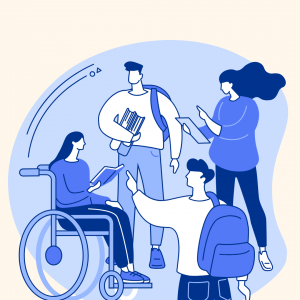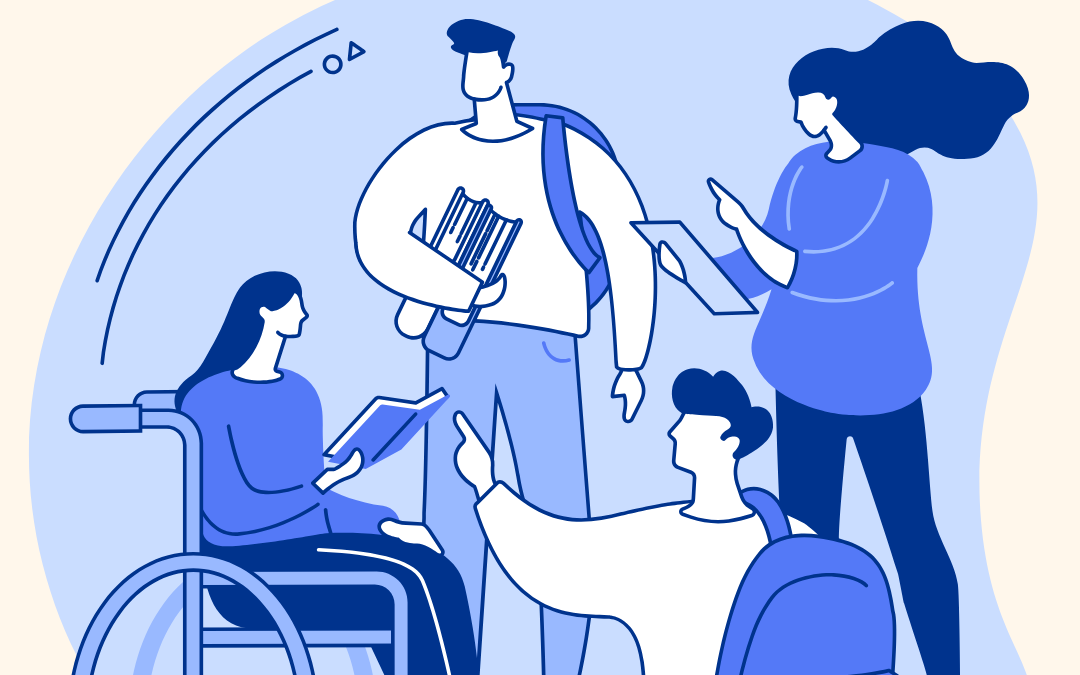 The 14th November to 20th December 2024 is UK Disability History Month. This year the focus for awareness is ‘Disability, Livelihood and Employment’. Creating spaces for work and for rest where Disabled people can be fully themselves, and fully participate in life together, is vital work in building the Kingdom of God and honouring God’s image in each of us.
The 14th November to 20th December 2024 is UK Disability History Month. This year the focus for awareness is ‘Disability, Livelihood and Employment’. Creating spaces for work and for rest where Disabled people can be fully themselves, and fully participate in life together, is vital work in building the Kingdom of God and honouring God’s image in each of us.
Earlier this year Leeds Church Institute hosted our second Disability Retreat. This was a safe space for Disabled Christians to come safe in the knowledge that they could come just as they are without needing to justify why they need certain adjustments or do not act in ways we often consider “normal” in church.
Shortly before the retreat we received an email enquiring why, with a theme of ‘Beyond Inclusion’, we were organising an exclusive event for people identifying as Disabled. The poem and reflection below go someway towards answering this question. We came together as Disabled people from a wide range of Church traditions, seeking the connections and sense of belonging that we long for in our home churches, but do not always receive.
Here, two participants at the retreat share their reflections from the day of learning and worshipping together. Sean offers a poem, and Clare shares her response to the deep theology contained within Sean’s short creative piece.
The Body of Christ in the Autumn
As the gap closes,
And daylight seeps from the sky,
We are connecting.
Sean Coppinger, written at the ‘Beyond Inclusion’ Disability Theology Retreat
The poem above responds to the experience of many Disabled Christians: there is a gap between how we are treated by our culture today and how we would like to live; yet there is hope to be found in Christian community. The poet’s words are also a meditation on a question asked at the retreat:
‘What might the passage “Be strong in the Lord putting on the whole armour of God” (Ephesians 6:10-11) mean for Disabled Christians?’
Military metaphors in scripture have always made me uncomfortable. As do Victorian hymns calling Christian soldiers to battle. This imagery was probably born out of the persecution of the early Church under the Roman Empire. I struggle with the ‘them versus us’ mentality implicit in this language. As my theology is built around God’s love and grace, and I struggle to relate to spiritual warfare, how might I understand these words in Ephesians?
Ephesians is well-known for its use of warfare, understandable if it was written when Paul was likely surrounded by Roman soldiers under house arrest; or composed later c. 100 AD by a Pauline scholar at Ephesus at a time when the emperor Domitian executed many Christians. The subheading in the Message translation of this passage is ‘a fight to the finish’, which, as a phrase not in the original Greek, betrays what was on the translator’s mind: an individual fight to overcome our sinful nature. But what about our health conditions and physical limitations? Life can often feel like a battle for Disabled people. At the retreat, we were invited to see armour as our medication, our physiotherapy exercises, our crutches, or wheelchair.
As someone with multiple health conditions, I am often told that I am an inspiration. I find that distressing because I do not want to be told I am brave, to be pitied, or held up as a moral example to others for sharing in Christ’s passion; I want the same opportunities as healthy people.
The author of Ephesians understood this.
The Greco-Roman world was a ‘might is right’ culture. Jesus had turned this on its head. Christians were called to shun physical prowess and instead seek spiritual connection with God and one another. It is easy today to forget just how subversive such language was. Christians often comment on how today’s culture resembles the Roman world. But that can be misleading. While the first century AD was a time when the strong were celebrated and the weak ostracised, it was also a time when people existed in community, far more so than today with our individualistic culture.
Ephesians calls for a new type of community. The letter applies male military language to include women, slaves, Disabled people and those excluded from religious society as unclean. Christians should act like a cohesive military unit – but not only for its courage. Roman soldiers acted as “one mind” (homothumadon). Each solider relied on his neighbour. Another translation of the concept of Christian strength in Christ from Ephesians might be “deploy yourselves unquestioningly in support of each other”.
Reflecting on putting on the armour of God, I realise that my protection is all around me: my Church family. We are not alone. Christian unity is God’s plan for everyone, including people disabled by society. The overarching theme in Ephesians is a call to imitate divine unity. Similarly, the body of Christ, Sean’s poem, reminds us to close the gap and connect everyone in Christian community.
Why am I Disabled, and not ‘differently-abled’?
Disability theology discusses the medical model of disability compared to the social model. Sociologists use these models to describe the relationship between a person with a bodily impairment or health condition and the society in which they live. The medical model is the traditional conception of disability developed by the medical profession. It focuses on diagnosis and how the disabled body is distinct from a healthy body, so the person is the problem. By contrast, the social model sees society as the problem in how it treats people with disabilities. The term ‘differently-abled’ is based on the medical model. My Crohn’s disease means that I am not abled; so, the term ‘differently abled’, for me, denies my lived reality of multiple surgeries, daily pain, and of being disadvantaged in the workplace (as I cannot work the same hours as a healthy person) and in social settings, where I need regular access to a toilet. In other words, I am disabled by society, but there’s hope that I can be abled by society too.
Clare Coleman, participant at the Disability Theology Retreat

